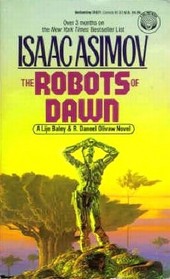Helpful Score: 2
I thought I had read this one before, but only elements of it were familiar to me. Most of it was not. Probably because it has been over ten years since I would have read it before. Midway through I was struck by how similar Elijah Baley is to Hercule Poirot. Like Poirot, Baley uses his "little grey cells" to comprehend the psychology of the murder and solve the mystery. However, Christie is able to do this in half the number of pages that Asimov takes. Of course, her Victorian sensibilities limit the amount of sex to a bare mention.
Amy R. (literaryjazz) reviewed The Robots of Dawn (R. Daneel Olivaw, Bk 3) on + 17 more book reviews
Helpful Score: 1
Sequel to The Caves of Steel and The Naked Sun. This is a Lije Baley and R. Daneel Olivaw novel.
Helpful Score: 1
Once some brisk expository introduction of his future societies is taken care of, Asimov's novel feels far more like a "normal" detective novel than like a science fiction one. However, this goes to show just how seamlessly and persuasively he folds in the sci-fi elements of the worlds he creates, because the science fiction aspect is definitely not simply decorative. The robotic and human characters are engaging and full of life, and the gradual unraveling of the mystery (as well as the exploration of the society of the planet Aurora) is very engrossing.
But for me the big weakness of the novel is the way that Elijah Baley's leaps of intuition are so vast and confident that they nearly have the feel of deus ex machina artificiality. The reader does come to understand how Elijah put the pieces together thus and so, but the dots being connected are so few and far between (unlike the workmanlike exposition of say, Conan Doyle) that it still feels more than a little strained.
The final key to the mystery, although it's extraordinarily intriguing in its implications, is popped out rather abruptly and awkwardly, and not much explored to make sense of it (at least this will come, however, in the sequel).
But for me the big weakness of the novel is the way that Elijah Baley's leaps of intuition are so vast and confident that they nearly have the feel of deus ex machina artificiality. The reader does come to understand how Elijah put the pieces together thus and so, but the dots being connected are so few and far between (unlike the workmanlike exposition of say, Conan Doyle) that it still feels more than a little strained.
The final key to the mystery, although it's extraordinarily intriguing in its implications, is popped out rather abruptly and awkwardly, and not much explored to make sense of it (at least this will come, however, in the sequel).





